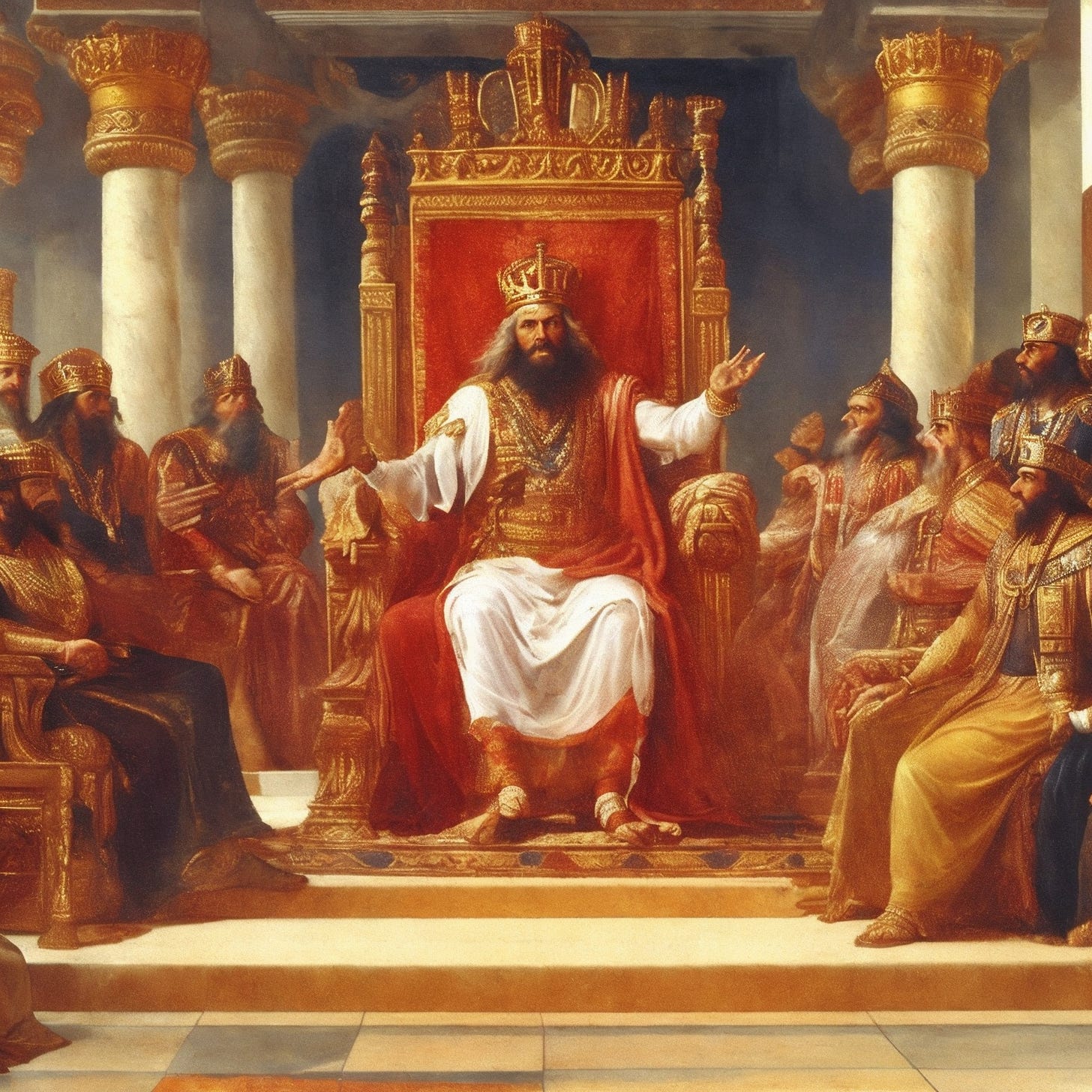Once upon a time, there was a king who left an indelible mark on the history of Israel because of his wisdom. His name was King Solomon. From the moment he entered this world as the son of the renowned King David and Bathsheba, it seemed destined for greatness.
Even in his early years, whispers of Solomon's extraordinary wisdom and understanding spread far and wide. As he grew older, his reputation as a wise and just ruler only intensified. But it was a particular story that showcased the brilliance of Solomon's judgment.
Legend has it that two women, residing in the same house, found themselves in a tragic predicament. They had both given birth within days of each other. One fateful night, tragedy struck when one of the women accidentally suffocated her own child while in the depths of sleep. Consumed by desperation, she secretly switched her lifeless infant with the other woman's living baby.
As dawn broke, chaos and confusion consumed the hearts of the women as they discovered the lifeless body of one child, their grief mingling with the uncertainty of whose child lay before them. Determined to seek justice, they turned to the one man known for his wisdom—the great King Solomon himself. In the heart of Solomon's court, the tension was palpable as the two women stood before the king. Their eyes were filled with anxiety; their voices trembled as they recounted their sorrowful stories. Solomon listened intently, his piercing gaze dissecting every word, every nuance, in search of the truth that lay hidden beneath the surface.
As the courtroom held its breath, Solomon's mind whirled with possibilities. How could he uncover the real mother, the one who held the key to unraveling this perplexing mystery?
In a moment that stunned the courtroom into silence, Solomon rose from his throne and proclaimed with unwavering resolve, "Since we can't determine who is the true mother, we shall divide the living child in two, granting each woman an equal share." Gasps filled the air, mingling with the anguished cries of the women who clung to the child that bound them together in this heart-wrenching dilemma.
Shock and horror gripped the room as the weight of Solomon's proposition settled upon them. The gravity of the situation was unbearable, as if the courtroom itself held its breath, awaiting the final judgment. Whispers of disbelief and despair passed through the onlookers, their hearts heavy with the impending fate that awaited the innocent child.
In this moment of unimaginable anguish, the true mother's love and selflessness emerged like a beacon amidst the storm. Her voice shattered the silence as she cried out, tears streaming down her face, "No! Spare the child's life! Let him live, even if it means parting from my embrace."
A smile curled upon the lips of the other woman. Her eyes, void of compassion or remorse, gleamed with a glimmer of anticipation. In the face of the child's impending doom, she displayed no trace of maternal affection, fueling her hopeful belief that perhaps, against all odds, the child would be hers after all.
Solomon's gaze moved from one woman to the other, his mind unraveled the tangled web of emotions that played out before him. It was then, in that climactic moment, that he unveiled his final judgment—one that would forever etch his name in the annals of wisdom.
"The true mother," Solomon pronounced with solemn authority, "is she who would give up her child, for a mother's love would never allow harm to befall her own flesh and blood."
The courtroom erupted into a mix of relief, astonishment, and awe. Solomon's wisdom had prevailed, the truth had been revealed, and the innocent child would be spared from the dreadful fate that had loomed over them all. The true mother's sacrifice, her willingness to relinquish her claim to save her child, resonated with the deepest truths of a mother's love—a love that knows no bounds, that transcends selfish desires. In that remarkable twist of fate, Solomon's wisdom transcended the expectations of the courtroom, surprising all who bore witness.
Wisdom goes beyond mere knowledge and intelligence. While knowledge knows, wisdom truly sees. The difference between knowledge and wisdom is not a matter of quantity but of kind. Having great knowledge does not automatically equate to possessing greater wisdom. Knowledge is something we possess, while wisdom is something we actively practice. Wisdom encompasses empathy and compassion, guiding our actions and shaping our interactions with others.
In today's digital age, we can access vast amounts of knowledge with a simple swipe of our finger. We have almost unlimited information at our fingertips, yet this abundance does not necessarily make us wiser. Information is a chaotic assortment of facts, whereas knowledge arranges these facts to some extent. Wisdom, however, untangles the facts, gives them meaning, and provides guidance on their application.
Wisdom is a skill that can be learned, but it demands effort. Expecting to stumble upon wisdom by chance is akin to hoping to learn to play the violin through sheer luck. Unfortunately, this is often the approach we take in life, aimlessly seeking fragments of wisdom while grappling with confusion. We frequently mistake urgency for importance, verbosity for thoughtfulness, and popularity for goodness. As a result, our way of living becomes misguided.
People often proclaim that knowledge is power, but this notion is not entirely accurate. Knowledge holds the potential for power. It resembles the energy in a light switch—until we take action and activate it, that power remains dormant and useless.
Knowledge left unutilized goes to waste. Ideas without action lead to delusion. Therefore, it is crucial to revisit and capture the key points and promptly take action upon them today.









